
UK schools and offices not equipped for impact of global heating, report warns
26.06.2025 08:03 — 👍 83 🔁 23 💬 9 📌 9@mariaberghs.bsky.social
Associate Professor, Director of TASC Unit https://tascunit.com/ and drinker of too much coffee. Sickle cell, thalassaemia, medical sociology, medical anthropology, disability studies and chronic illness.

UK schools and offices not equipped for impact of global heating, report warns
26.06.2025 08:03 — 👍 83 🔁 23 💬 9 📌 9
Thank you to all who attended our protest against DMU cuts held at Trinity House this afternoon, students, staff, members of the public. The message was clear: #DefendDMU
25.06.2025 13:50 — 👍 7 🔁 4 💬 0 📌 0
Fantastic to see this kind of solidarity from students!
#DefendDMU #NoConfidence
For those of you who don't know, DMU is currently proposing mass redundancies, with nearly 100 academic staff 'at risk', sadly including me. It is absolutely brutal.
Please spread the word about this protest rally happening next week in Leicester and come and support us if you're able. #DefendDMU

World Sickle Cell Day. Patients, clinicians and researchers have been saying it for decades. Patients with sickle cell get worse care than people with similar conditions and they don't get the same funding. #sicklecell #care #patients #NHS #inequalities www.theguardian.com/society/2025...
19.06.2025 06:17 — 👍 0 🔁 0 💬 0 📌 0
Thanks again to the Gazette for allowing a colleague the space to explain the situation so many academics are dealing with at DMU right now
www.leicester.news/i-work-at-dm...

📢 National Demo Announced at Newcastle University
UCU members from across the UK will descend on Newcastle on Wednesday 11 June for a national demonstration against job cuts.
✊ Join us and make your voice heard
www.chroniclelive.co.uk/news/north-e...
Today is the day!
@cripmadsymposium.bsky.social is hosting our first symposium!
Intersections of Sociology with Crip Theory and Critical Disability Studies and Mad Studies
See those who have signed up very soon!
#MadCrip2025

Apply by Friday (13 June) to become a member of the @bjse.bsky.social editorial board
Expertise in digital technologies and/or quant methods particularly welcome
think.taylorandfrancis.com/editor_recru...

The COVID-19 pandemic has illustrated how critical it is to invest in healthcare systems and develop professionals as assets to our local and global public health resources. www.frontiersin.org/journals/soc...
11.06.2025 07:35 — 👍 0 🔁 0 💬 0 📌 0Towards a Sociology of Healthcare Robots
#academicsky #digitalhealth 🧪
onlinelibrary.wiley.com/doi/full/10....

Nominate a friend to go to Glastonbury festival 2025 and be in with the chance of winning a pair of tickets
23.04.2025 17:00 — 👍 16 🔁 2 💬 3 📌 1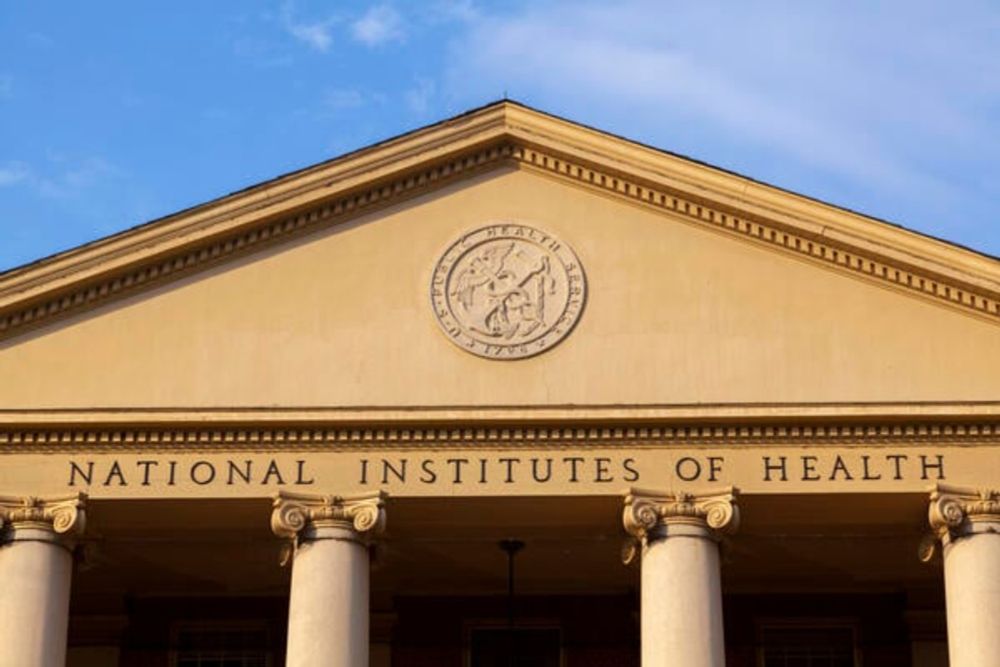
No NIH Grants for Colleges With DEI Programs or Israel Boycotts
Colleges will have to comply with new certification requirements in order to receive any funding from the NIH, effective immediately. #HigherEd #EDUSky #AcademicSky bit.ly/3S0baoS

A truly great sociologist, who made big wide-ranging contributions. His 1988 ASA presidential address called for a “public sociology” that directly engaged non-academic readers. Such a shame to lose giants like Michael Burawoy and Herb Gans in the past few weeks. www.nytimes.com/2025/04/21/b...
22.04.2025 05:04 — 👍 16 🔁 5 💬 1 📌 0
Our Annual 'Roger Hood' Lecture will be given this year by Didier Fassin, Collège de France and Institute for Advanced Study, Princeton: www.law.ox.ac.uk/content/even... In Person only - sign up to attend at: bit.ly/4jfDiAk
22.04.2025 11:45 — 👍 5 🔁 6 💬 1 📌 1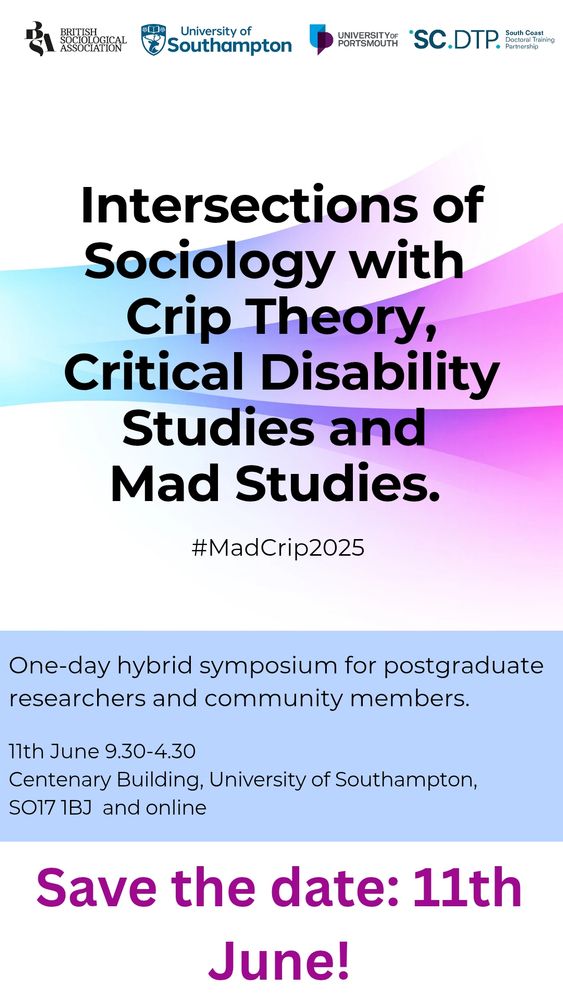
Poster for Intersections of Sociology with Crip Theory, Critical Disability Studies, and Mad Studies. One-day hybrid symposium for researchers and community members. 11th June 9 30 - 4 30 Centenary Building, University of Southampton, SO17 1BJ. And online! Save the date: 11th June
Save the date!!!! 📢
Intersections of Sociology with Crip Theory, Critical Disability Studies, and Mad Studies.
One-day hybrid symposium for researchers and community members.
11th June 9.30 - 4.30
Centenary Building, University of Southampton, SO17 1BJ. And online!
#MadCrip2025 #AutRes
Intersections of Ageing and Disability during the COVID-19 pandemic edited by Bethany Simmonds and myself www.frontiersin.org/research-top...
22.04.2025 17:24 — 👍 0 🔁 0 💬 0 📌 0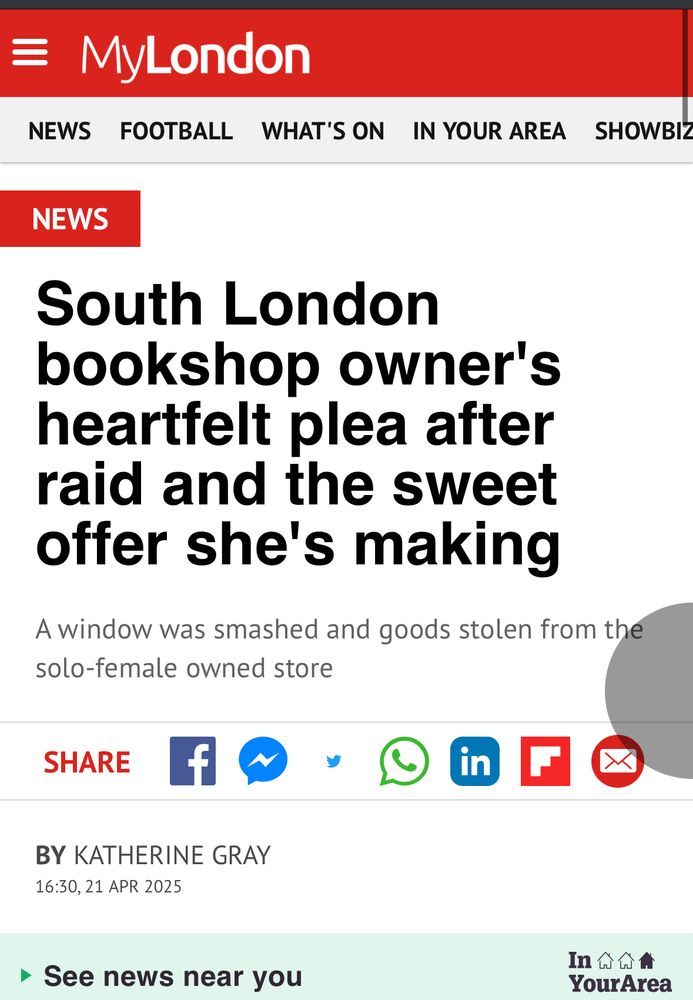
South London bookshop owner's heartfelt plea after raid and the sweet offer she's making A window was smashed and goods stolen from the solo-female owned store SHARE BY KATHERINE GRAY 16:30, 21 APR 2025 • See news near you In介介俞 Your Area
If you are anywhere near #camberwell today - why not visit Lala Books - have a browse, but a book, be lovely
22.04.2025 10:11 — 👍 730 🔁 212 💬 13 📌 11
Rest in Peace. Graham Sergeant was a giant in sickle cell research. He was also responsible for introducing me to the Sierra Leone Sickle Cell Society. I remain very grateful www.theguardian.com/society/2025...
22.04.2025 17:14 — 👍 0 🔁 0 💬 0 📌 0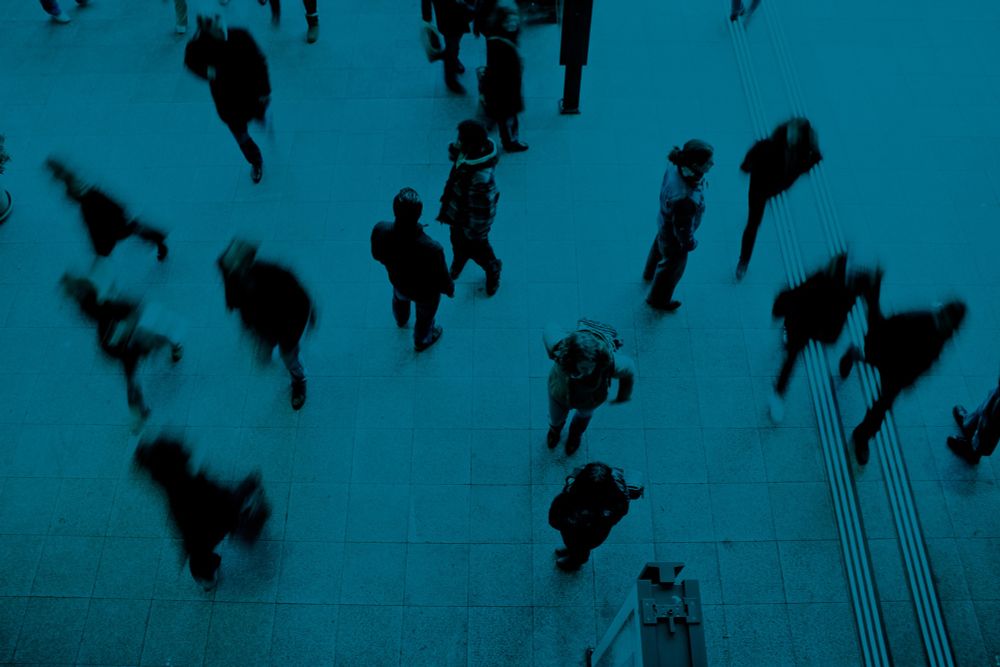
We're hiring! Vacancies for 3 permanent research positions at the Assistant/Associate Professor level at NIDI (The Hague), in the field of labor market studies, inequality, and human geography/spatial studies. #Sociology #Demography #SocialSciences #Economics
nidi.nl/en/about-us/...

THE INDEPENDENT: Reeves defies poverty warnings as welfare cuts loom, insisting reforms will boost jobs instead of pushing families into hardship. Disability advocates brace for a potential crisis amid government insistence on ‘reform’.
- by Kevin Schofield
Does anyone have access to Barkley (1997) "Attention-deficit/hyperactivity disorder, self-regulation, and time: toward a more comprehensive theory" and is able to send this to me?https://journals.lww.com/jrnldbp/abstract/1997/08000/Attention_Deficit_Hyperactivity_Disorder.9.aspx
#ADHD #AcademicSky

It’s disappointing to see the DWP announce that it has no plans to publish the responses to the upcoming consultation on health & disability benefit reform, despite pledging to increase transparency. Thanks to Ayoub Khan for raising this.
questions-statements.parliament.uk/written-ques...

In contrast to perceptions of the war phenomenon as a situation of exception and, as such, a shocking and obscure object, apprehending the war from an ordinary perspective and through a socio-historical approach is a fruitful entry point for understanding the functioning of societies, the solidity of social ties that sustain them, the solicitude they manifest for their populations exposed to the outbreaks of violence, and, in particular, for the violated, displaced, exhausted, sick, wounded, mutilated, or people experiencing disabilities. The relationship between wars, their bodily/mental impacts and care has been studied extensively in the history of medicine, welfare policies, veterans, and disability, but mainly from the perspective of Western European or North American societies. Research highlights a constant concern of health professionals, supported by charity and voluntary organizations for bodies affected by violence from WWI, not to mention earlier conflicts, to international military operations in Iraq or Afghanistan. Those efforts range from providing training for soldiers and civilians, professionals, and ordinary actors (e.g., fighters, civilian defense volunteers), as well as the deployment of (para)medical logistics and emergency first aid near the front line, to the supply of medicines, in-hospital care, development of new care infrastructure and body-repairing techniques. Analyses focusing on care for bodies impacted by wartime violence in East-Central and East-Southern European societies remain scarce to date. Existing research points to difficulties in developing an adequate and comprehensive medical response because of the scale of bodily and mental injuries on the Eastern front(s), as well as to a long-standing tendency for social disregard for incapacitated veterans and civilians who are marginalized in redistributive schemes, reduced to poor-quality prosthetic services, or even to begging on the streets as in the USSR. This draws, in essence,…

The aim of this conference is to fill an important gap in our understanding of the relation between war, violence-affected and thus fragilized bodies and care in East-Central and East-Southern European societies in a long-term perspective, that of the armed conflicts of the 20th-21st centuries. East-Central and East-Southern European societies have historically been disrupted by the brutality of war violence and confronted with the short- and long-term challenges of managing its consequences, evolving in a context of collapsing empires and emerging new states in the borderlands, of constantly redrawn borders and changing political regimes, but also engaged in an intense circulation of ideas, norms, models, people, and practices. Therefore, East-Central and East-Southern European societies constitute a laboratory for social innovation in caring for violence-affected bodies on various scales (community, associative, humanitarian, municipal, state, national, international). The conference’s objective is also to shed light on multiple entanglements between body and care in the ordeal of war through a resolutely interdisciplinary dialogue between historians and sociologists, but also open to other social scientists, and through both “top-down” and “bottom-up” approaches, or multi-scalar analysis. We define care broadly, both as curative treatment (cure) aimed at recovering and, by extension, a system of organized provision of medical care (healthcare), and as social relations, attitudes, policies, and practices of assistance to others, that are exercised in a variety of settings (charity, voluntary help, family, paid work…) and rely, at the level of social care, on interventions by public authorities, communities and private actors in support of people considered as vulnerable (welfare). In the context of armed conflicts, care also involves a significant militarization of actors (patients, care-providers) and the renegotiation of what taking care and providing care means…

Among the topics we would offer for consideration are: Body and mental health. What are the main impacts of military strategies (bombing, blockades, occupation), technologies (equipment, transportation, housing), weapons or ammunition, and protective gear (bulletproof vests, helmets, masks) on bodies and mental health? How are these bodily impacts (diseases, wounds, mutilations, disabilities) medically treated and socially cared for during the war and in its aftermath? How are psychological traumas and mental disorders, which have long been marginalized and now statistically dominate the spectrum of illnesses observed in many wartime contexts, assessed, and managed? What correlations can be observed between the evolution of the warfare means and the injuries sustained, from the mass shelling of the First World War to the intensive use of drones and rockets in the Russian-Ukrainian war? What physical and mental after-affects do the lived experiences of wartime violence leave in the long term? How do they impact individual and collective trajectories of those concerned? Finally, how are dead bodies handled? Hygiene, nutrition, epidemics. By bringing extremely precarious living conditions, the war results in major health problems for both the military and civilians and in spreading of water, sanitation, and hygiene- associated diseases. What kinds of solutions does the war favor at the political, military, scientific, medical, industrial level in face of epidemic outbreaks and hygienic vulnerability? What is the role of technological innovation, sanitation programs and education in sanitary policies? Healthcare institutions and actors. How does the war affect healthcare institutions and actors, both military and civilian? How do institutions and actors respond to wartime emergencies: huge contingents of sick, violated, wounded, mutilated bodies; propagation of epidemics; threats to the most vulnerable categories (children, the elderly, people with disability)? How …

Healthcare institutions and actors. How does the war affect healthcare institutions and actors, both military and civilian? How do institutions and actors respond to wartime emergencies: huge contingents of sick, violated, wounded, mutilated bodies; propagation of epidemics; threats to the most vulnerable categories (children, the elderly, people with disability)? How do they cope with the lack of medicines and specialized care facilities? How does war transform the geography, chains, and standards of healthcare, as well as the gestures and practices of medical practitioners? What therapeutic, surgical, and prosthetic innovations does the war encourage? What impact does it produce on (para)medical training? How does it redefine the boundaries of professionalism (versus amateurism/volunteering), and redraw the profile of actors admitted to step in to provide medical assistance? Finally, how does the war and its sanitary shortfalls contribute to the reconstruction of healthcare institutions and medical standards in the aftermath of war? Care provision, regimes, and infrastructure. Emergency, in particular the need to enable wounded and sick to fight again in context of mass casualties, is one of the main factors structuring the provision of care or its denial (through triage) in wartime. As a result, the war induces a radical (re)definition of care priorities, hierarchies and vulnerabilities. Whom, between soldiers and civilians, are to be protected and cared for first? What other categories (children, women, elderly people, civilians with disability, displaced persons, veterans) are to be considered as vulnerable, deserving or worthy, and prioritized? How do gender, ethnicity, age, nature of injury or disability, civilian/military, national/allied/foreign, or enemy status underpin the categorization of populations during the war and regulate the access to care, including some while excluding others? What inequalities or medical discrimination in access to care do the…
📢 Call for paper: "Body and care in the ordeal of war"
📍Prague, November 12-14 2025
📅 Deadline: May 5, 2025

Living with a chronic illness at work can be tough—but asking for help shouldn’t be. Learn how to advocate for yourself, access support, and navigate workplace challenges.
#EDS #Unremarkableme
#ChronicIllness #InvisibleIllness #DisabilityRights
www.unremarkableme.com/post/chronic...
This for our #DMU #students: #Design #Intern needed starting in Autumn 2025 using any medium like #photography #drawing #graphicart #art #multimedia There's loads of opportunities via #frontrunners on #Mygateway Apply by 3rd of March #paid #internship
27.02.2025 09:44 — 👍 4 🔁 0 💬 0 📌 0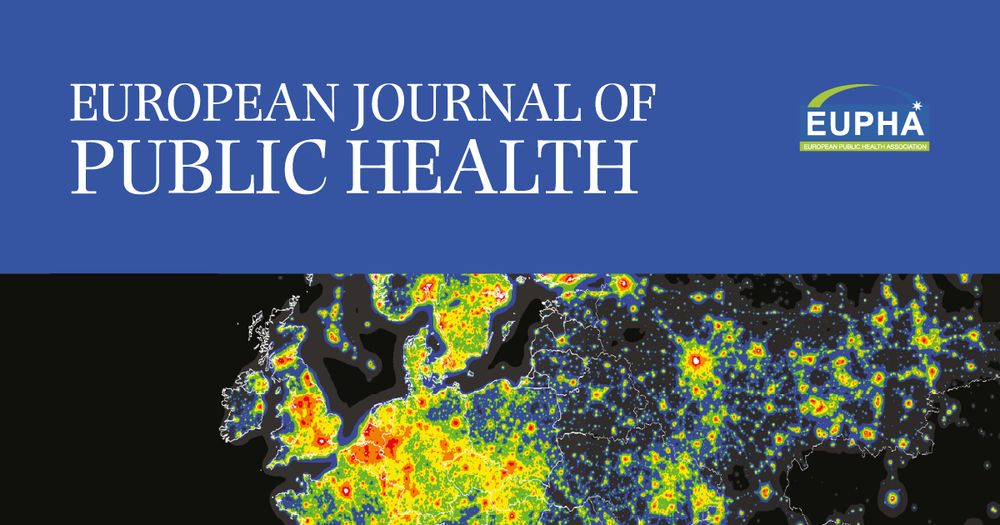
Truth to power. Well done, @martinmckee.bsky.social
academic.oup.com/eurpub/advan...